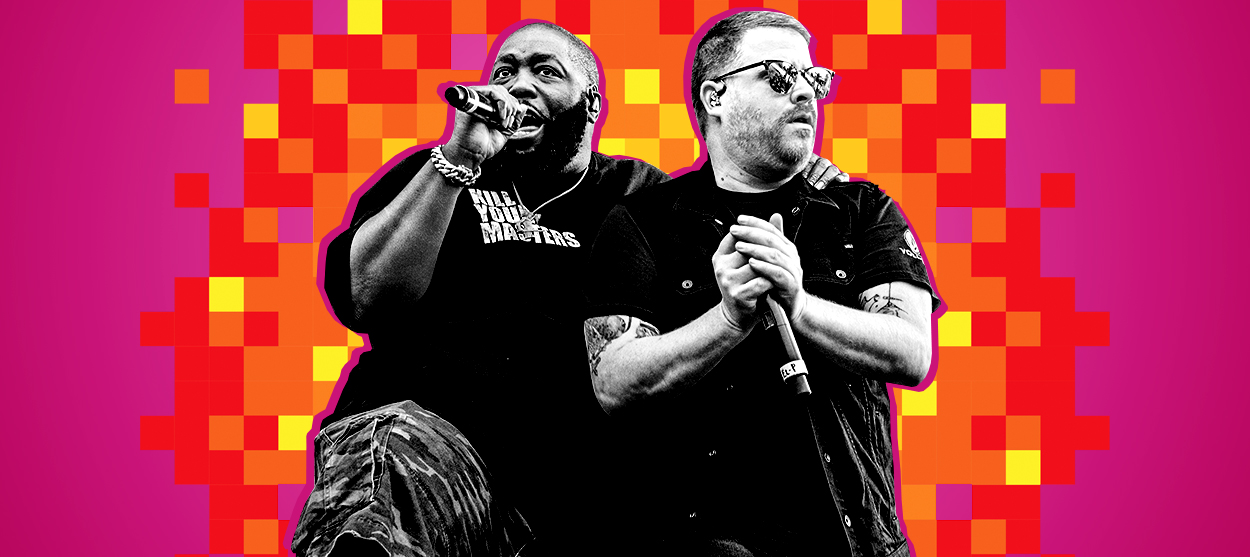The unintentional soundtrack of the George Floyd protests
Run the Jewels' latest wasn't meant to be the background to an uprising. That's partly what makes it so powerful.


A free daily email with the biggest news stories of the day – and the best features from TheWeek.com
You are now subscribed
Your newsletter sign-up was successful
In mid-May, the New York rapper, producer, and ex-indie label executive El-P discussed his past work with The Ringer, and dismissed any notion of his artistic prescience. His debut solo album, 2002's abrasive, paranoid Fantastic Damage, was seen upon its release as a misanthropic survey of post-9/11 America. But, he told the site, it was recorded before the attacks. "So the s--- that you're hearing on that record, believe it or not, is from a guy who, before 9/11 happened, was thinking the way that everyone started thinking when 9/11 happened… I was annoyed and angry that people weren't thinking this way until something f---ing horrible happened to them … That was the first experience I'd ever had with a record landing at a time when there had been some event that people naturally associated with it."
19 years later, it has happened again, and with even greater force. El-P is now best known as one half of Run the Jewels, his duo with the Atlanta rapper Killer Mike; their fourth album, RTJ4, was rush-released on June 3 to a country at war with itself. "The world is infested with bulls--- so here's something raw to listen to while you deal with it all," they posted on Instagram. The group, which started as a mixtape project in 2013, has become a dependable source of rap that is at once irate, despairing, defiant, and funny. Across their catalog, El-P's production has maintained a precise and relentless cacophony; none of their 40-odd songs could be considered a "breather." But while their first three albums (and Mike's vocal support of Bernie Sanders) got them labeled "protest rappers," their pranksterism — lyrically assaulting baby bears and poodles, remixing RTJ2 to get more cats in it — sometimes overshadowed their furor. They sounded political even when they were goofing off though. "[RTJ3] feels like a protest album," The New Yorker wrote in 2017, "in the way that many things that sound a note of refusal feel political these days."
This time around, there is no ambiguity or need for that qualifying "feels." The police killing of George Floyd and the convulsions that have followed hang over RTJ4 like an inverted flag. But as with Fantastic Damage, it isn't prescient; it simply documents what most have tried to ignore.
The Week
Escape your echo chamber. Get the facts behind the news, plus analysis from multiple perspectives.

Sign up for The Week's Free Newsletters
From our morning news briefing to a weekly Good News Newsletter, get the best of The Week delivered directly to your inbox.
From our morning news briefing to a weekly Good News Newsletter, get the best of The Week delivered directly to your inbox.
"And you so numb you watch the cops choke out a man like me/And 'til my voice goes from a shriek to whisper 'I can't breathe,'" Mike raps on "Walking in the Snow." "And you sit there in house on couch and watch it on TV/The most you give's a Twitter rant and call it a tragedy."
The fact that he was referencing Eric Garner in 2014, and not Floyd in 2020, both amplifies his rage and deepens the guilt of his white armchair "allies." Such music would be bracing at any time, but in our present context, it practically suffocates. Run the Jewels has always sounded urgent, but RTJ4 feels necessary in a way that it wouldn't have if it dropped two months ago. A review of the album by The New York Times, published before the protests, said that such music "can serve as a galvanizing reminder that millions of people feel just as you do, and are burning for change… It can also, at least, give you something to move to inside your apartment while waiting to see what's next."
People will no doubt move to RTJ4, but its purpose seems higher now. In the three and a half years since Donald Trump took office, his administration — with its race-baiting power moves, Constitutional insults, and ravaging of norms — has not been musically met in kind. There have been strong exceptions: Childish Gambino ("This is America"), YG ("FDT" — sure, decipher the acronym), Kendrick Lamar, Fiona Apple, Solange, and others. But the songs didn't coalesce into a recognizable movement, an artistic swelling to match the menace above. Maybe the musical landscape was too fractured to support such a thing. Perhaps, as some have argued, the president's bluster has been empty all along. Or, as the comedian Patton Oswalt contends in a recent special, Trump's presidency is a disaster so grotesque that commentary is redundant. Whatever the reason, and despite widespread loathing of Trump, like-minded musicians remained in their own corners of Spotify.
The early sixties had Bob Dylan, Pete Seeger, and the Village folkies, who agitated for civil rights and against the bomb. The latter part of the decade was marked by the Woodstock bands whose very existence was a threat to the pro-war status quo. In the seventies, Marvin Gaye, Nina Simone, and other soul artists described the black experience in new and wrenching terms; as that decade closed, the punks described their own by tearing everything apart. And on it went. Sort of.
A free daily email with the biggest news stories of the day – and the best features from TheWeek.com
Somewhere along the way, the idea of protest music as a cultural necessity fell by the wayside, to the point where Bruce Springsteen's "Born in the USA" — a 1984 song about a veteran's shattered life — could be viewed as rah-rah pap. The music has never gone away — Public Enemy, Rage Against the Machine, and System of a Down gained huge audiences by agitating as loudly as possible — but, like Kendrick Lamar, they were outliers, however popular. "It's not like Vietnam," The Flaming Lips' Wayne Coyne said in a 2010 history of protest music. "The youth aren't dying in the same way. There's no protest, really. [Listeners] ... just didn't give a s---."
But that was 10 years ago. America in 2020, with its marches, batons, and riots in the streets, suddenly feels like 1968. People give a s---. And musicians are responding, with new protest songs by Denzel Curry, LL Cool J, YG (this time, it's "FTP"), and others in the past week alone. And, of course, there is RTJ4, recorded before George Floyd's killing but after dozens like it. If the new flourishing of protest music builds to something more, the shrieking, thumping album will be this era's What's Going On or its London Calling.
"We want to see four officers prosecuted and sentenced," an emotional Mike said in a recent press conference. "We don't want to see Targets burning. We want to see the system that sets up for systemic racism burnt to the ground." He and his partner have supplied the soundtrack to that dismantling. We will now see if more artists join the fight.
Want more essential commentary and analysis like this delivered straight to your inbox? Sign up for The Week's "Today's best articles" newsletter here.
Jacob Lambert is the art director of TheWeek.com. He was previously an editor at MAD magazine, and has written and illustrated for The Philadelphia Inquirer, Philadelphia Weekly, and The Millions.
-
 Antonia Romeo and Whitehall’s women problem
Antonia Romeo and Whitehall’s women problemThe Explainer Before her appointment as cabinet secretary, commentators said hostile briefings and vetting concerns were evidence of ‘sexist, misogynistic culture’ in No. 10
-
 Local elections 2026: where are they and who is expected to win?
Local elections 2026: where are they and who is expected to win?The Explainer Labour is braced for heavy losses and U-turn on postponing some council elections hasn’t helped the party’s prospects
-
 6 of the world’s most accessible destinations
6 of the world’s most accessible destinationsThe Week Recommends Experience all of Berlin, Singapore and Sydney
-
 The billionaires’ wealth tax: a catastrophe for California?
The billionaires’ wealth tax: a catastrophe for California?Talking Point Peter Thiel and Larry Page preparing to change state residency
-
 Bari Weiss’ ‘60 Minutes’ scandal is about more than one report
Bari Weiss’ ‘60 Minutes’ scandal is about more than one reportIN THE SPOTLIGHT By blocking an approved segment on a controversial prison holding US deportees in El Salvador, the editor-in-chief of CBS News has become the main story
-
 Has Zohran Mamdani shown the Democrats how to win again?
Has Zohran Mamdani shown the Democrats how to win again?Today’s Big Question New York City mayoral election touted as victory for left-wing populists but moderate centrist wins elsewhere present more complex path for Democratic Party
-
 Millions turn out for anti-Trump ‘No Kings’ rallies
Millions turn out for anti-Trump ‘No Kings’ ralliesSpeed Read An estimated 7 million people participated, 2 million more than at the first ‘No Kings’ protest in June
-
 Ghislaine Maxwell: angling for a Trump pardon
Ghislaine Maxwell: angling for a Trump pardonTalking Point Convicted sex trafficker's testimony could shed new light on president's links to Jeffrey Epstein
-
 The last words and final moments of 40 presidents
The last words and final moments of 40 presidentsThe Explainer Some are eloquent quotes worthy of the holders of the highest office in the nation, and others... aren't
-
 The JFK files: the truth at last?
The JFK files: the truth at last?In The Spotlight More than 64,000 previously classified documents relating the 1963 assassination of John F. Kennedy have been released by the Trump administration
-
 'Seriously, not literally': how should the world take Donald Trump?
'Seriously, not literally': how should the world take Donald Trump?Today's big question White House rhetoric and reality look likely to become increasingly blurred
